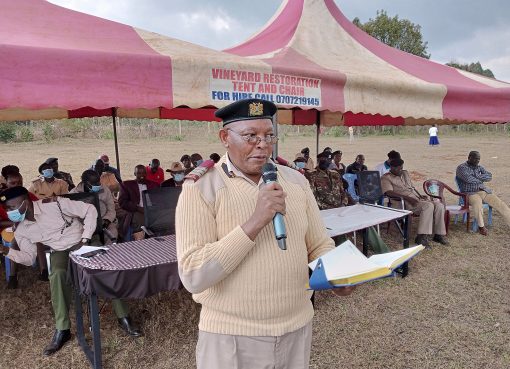The Matatu owners within Rift Valley Region have raised a red flag over infiltration of organized criminal gangs in operation and management of bus termini which they say has resulted in losses exceeding Sh. 50 million per month.
They have petitioned Interior Cabinet Secretary (CS), Dr. Fred Matiang’i and Inspector General of Police (IG), Hilary Mutyambai to form a special unit of law enforcement agents that will be dedicated to dismantling the gangs which they claimed besides extorting matatu drivers were robbing passengers.
At a consultative meeting convened jointly by the National Police Service and Matatu SACCOS operating with the region, the Central Rift Matatu Owners Association Chairman, David Kuria lamented that gangs had displaced public service vehicles from termini owned by County government.
Kuria further observed that the criminal gangs were largely responsible for fixing high fare prices particularly during high peak seasons such as during Easter, Christmas and New Year festivities.
He called on the government to intervene as the matatu sector provided a livelihood for millions of Kenyans directly and indirectly.
However, the Nakuru East Deputy Sub County Police Commander (SCPC), Daniel Gitavi said detectives had stepped up crackdown against organized gang members and extended the operation from bus stops to estates they are known to retreat to after committing criminal acts.
Gitavi assured the operators that following merging of administration and regular police, the number of security personnel deployed to the Central Business District and Bus Termini had increased significantly dealing a blow to smooth operations of the gangs.
He said a significant number of arrests of members of a notorious gang had been made and mobile phones recovered from suspects yielding useful tips.
The consultative forum also saw presentations from the Directorate of Criminal Investigations (DCI) and the National Transport and Safety Authority (NTSA)
A report tabled by officials from the DCI revealed that some of the criminal gangs were being propped up by former employees of matatu Saccos who had been fired for indiscipline or other reasons.
The DCI detailed how some unscrupulous drivers and touts attached to respected SACCOS were being used as couriers for illicit brews and narcotic drugs and were networking with members of organized gangs to convey the contrabands into estates.
Kuria told the meeting that though the county government had the capacity and human resource to uproot criminal gangs from bus parks, its top management was reluctant to act.
In the past, influential politicians have been accused of sponsoring and bailing out of court members of organized gangs once they are arrested.
The matatu industry’s concern comes hot on the heels after residents in several estates within Nakuru complained that the organized gangs were terrorising them with impunity and enjoyed protection of a certain member of parliament.
Gitavi called on matatu operators to report to police any strangers extorting money from public service vehicles. He conceded that many passengers particularly women had lost money and valuables to such gang members.
The Officer in charge of Traffic, Christina Orina faulted some matatu owners for employing drivers and conductors without verifying authenticity of their documents.
Orina challenged operators to vet prospective employees before hiring them and issue all their staff with name tags for easy identification.
She observed that following a crackdown, scores of drivers and conductors were caught with forged certificates of good conduct and driving licenses.
Orina warned that criminal gangs were taking advantage of forged documents to infiltrate genuine matatu operation systems.
She also warned that the county was witnessing an increased number of drunk driving cases which were contributing to the road carnage.
The NTSA Safety Officer, Charles Otieno announced that mandatory retesting of drivers both physically and mentally would start soon.
He said the exercise will initially focus on Public Service Vehicles before being rolled out to private motorists.
By Anne Mwale




